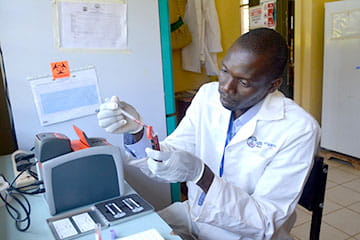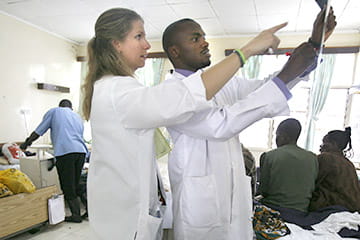AMPATH’s research network is dedicated to improving the health of the Kenyan people by enhancing the quality of patient care provided at AMPATH clinic sites and informing health policy in Kenya. The research network supports and sustains high-quality research ranging from basic science to translational and implementation research; strengthens and informs care programs; enhances all the health care institutions engaged in this global partnership; opens working groups to any interested faculty from the AMPATH Consortium who are committed to collaborative research; develops human capacity through training and education; and creates infrastructure that enhances institutional capacity for the conduct of world-class research.
 Research Infrastructure
Research Infrastructure
The AMPATH Research Program Office supports the research activities of AMPATH consortium partners from North America and Kenya with offices and dedicated support staff hosted at Indiana University School of Medicine and Moi University. Office staff support a world-class research infrastructure in Kenya that includes an electronic medical records system with more than 150,000 patients used for research, an IRB with US Federal Wide Assurance, a research- and sponsored-projects office that handles nearly $17 million in research awards per year (with nearly two thirds from U.S. federal sponsors like the NIH), an ISO and DAIDS-accredited research laboratory, a clinical trials unit, a biorepository facility, and a modern research facility housing project space for IU School of Medicine researchers and AMPATH-consortium partners.
The AMPATH Research program Office also provides secure file storage, three training rooms, and four video and teleconferencing suites hosting more than 80 research-focused conference calls per month.
 Professional Development and Training
Professional Development and Training
Along with this investment in infrastructure, IU School of Medicine has supported the professional development and training of hundreds of Indiana University and Moi University faculty and staff. Program staff assist investigators in navigating this environment to develop, implement and disseminate collaborative research projects to improve health for people in resource-limited settings around the globe.